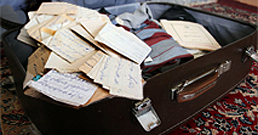“I have drawn these two hearts on top of the letter. I don’t know what else to say. The experience of this long war cannot be described in a letter. I am writing just a few lines to let you know that your Abbas is still alive, and God willing we will spend the rest of our lives together.” These poignant lines were written by Nabi’s father in one of the letters sent to his wife from the Iran-Iraq warfront. Tragically, his wish was never fulfilled, and he never retuned home to his wife and his six months old son, Nabi.
When Nabi grew a little older, he was curious to find out more about the father he had never seen, but he was reticent to ask his mother in case it would upset her. Then, disaster struck again when he was about eight years old. He came home from school one day to find that their house had burned down together with all his father’s mementos except a suitcase which had miraculously survived. He had always seen this case in his mother’s bedroom but had resisted opening it.
Several years later he finally let curiosity get the better of him and he opened it with trembling hands. Inside, not only did he find some items of his father’s clothing and other belongings, but also an envelope containing his letters from the warfront. Although the letters were addressed to Nabi, they were in fact love letters written to his mother. Knowing that the letters would be checked before being sent off, his father was too shy to use his wife’s name.
The letters were a treasure-trove through which Nabi learned a great deal about the father he never knew and to whom he could now feel much closer. They opened a window onto the inner feelings of a man who was so caring and thoughtful that even in the midst of artillery fire and bombs he wrote to his wife: “Promise me to wear gloves when washing the dishes”. He was a man who said that he hates killing people and cannot bear to see his friends being martyred, and that he is looking forward to the day when the war ends and he can be united with his wife.
Conscious of the devastating impact of the war on his life and on his mother who is still grieving, Nabi feels for all those other people whose lives have been shattered in the same way. He turns to his father: “I don’t know how many other lovers shared your destiny, how many other households have been plunged into darkness, spending their days going through photographs, folded clothes and mementos, and painfully reviving distant memories. But I know that the graveyards wouldn’t be so vast and people wouldn’t have been subjected to so many years of pain and suffering if there had been no war.”
The 30th anniversary of the Iran-Iraq war is an occasion for Nabi to share with us his touching story and his innermost emotions in this deeply moving multimedia report.


